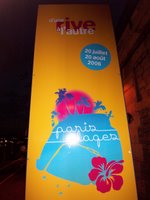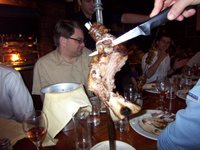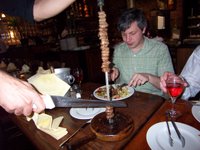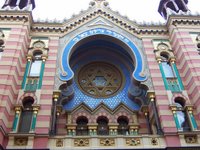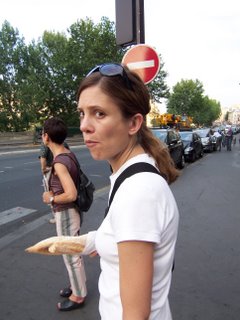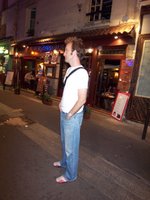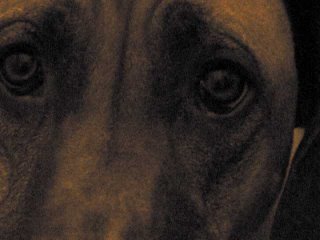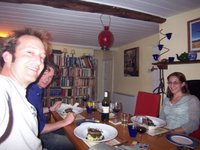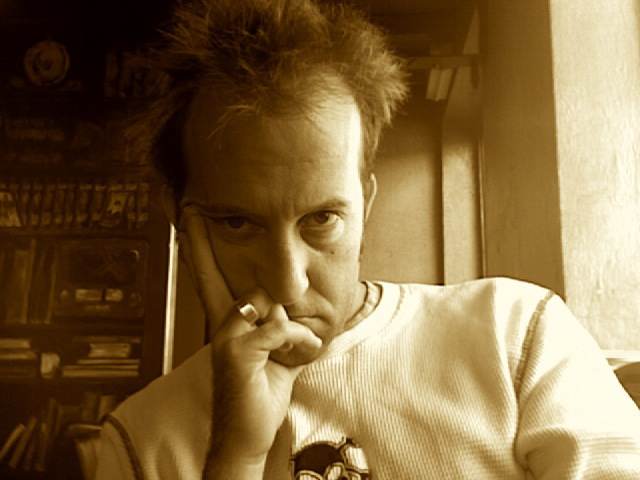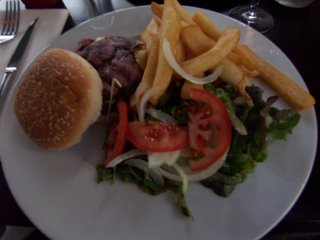 I thought I found God in a Hamburger
I thought I found God in a HamburgerI thought I found God in a hamburger. I don’t mean in the sense of seeing the Virgin Mary in a knothole or Jesus in some cheesecloth. I mean I found a burger that moved me -- and everything around me – to the point where I had to lift the bun to see if there was something visibly different from the countless previous burgers I’ve ingested, to see whether doing so would reveal, well, who knows what?
To be technical, it wasn't actually a burger. It was, per the menu, the Royal Hamburger Steak Deluxe with cheese, salad, Canadian bacon and frites on a plate. Lifting the top bun showed nothing out of the ordinary. Brown on the edges with the occasional charred spot, pink inside with a slender horizon of red running precisely through the center, a slight bit of mayo on the underside of the bun with a tomato and some lettuce with just a splash of dressing. It was undoubtedly well-prepared, and for $18 it should have been, but there was nothing apparent in it, on it, or around it that suggested it was anything very special. It looked like a burger.
And yet somehow it transcended my notion of what ground beef between two slabs of bread could be. Not only that. It altered the course of an evening. It kicked up a cross breeze on a hot Paris night and drew it through the corner of the brasserie. It cooled my brow and coaxed the rosé into a dance across my tongue, caused it to linger in the back of my throat far longer than what is normally possible from a house wine. With each bite, the vinegar on the lettuce gently pulled at the sides of my cheeks. And as I chewed, the patrons around me smiled, the sun lingered late in the sky, and my mind ran free with thoughts about happiness and curiosity and motivation and challenge and luck and gratitude. In the course of the meal, I read a piece by Nora Ephron in the NYer, slowly flipping the pages through a beautiful tale of her decades-long affair with an Upper West Side apartment building, and I realized that Nora and I – and my burger and her loft – were having a moment.
Two days later, I returned to the brasserie to experience the holy grail of burgers again. The waiter remembered me. He knew my order before I crossed the threshold. Of course he did. I had only been there once, but I had become a regular, an enthusiastic consumer of the $18 ecstasy burger. But when my burger came (that’s it, in the photo above), it was merely a piece of meat…and a bit dry, at that. The room was hot, the patrons around me were smoking. With the first bite of my burger, I kinda wanted to leave. Same scenery, but all the details had been swapped. I eventually did leave, disappointed; my relationship had become a one-nighter.
In the following two weeks, nearly every day I obsessed over the Royal Hamburger Steak Deluxe with cheese, salad, Canadian bacon and frites on a plate …wondering how the first one could have hit such heights only to be followed by something that was described the same way on the menu and yet was, paradoxically, infinitely ordinary. My expectations had changed. I yearned to love the second burger just as much the first. But I didn’t, and so I started to miss that first burger and everything that came with it. I wanted that moment back.
Ultimately, I decided it was time to move on, and slowly I grew content to remember the experience and became grateful to have had it once. Then I arrived back in Cambridge and I had a tryst with a raisin.
The Very Rich Foundation arranged a presentation on mindfulness meditation. The lecturer walked us trough the basics of the discipline and its effectiveness in cognitive therapy, and then moved the class outside for a workshop. He placed a few raisins into the right palm of each fellow, distributing them the way a priest hands out the Eucharist. We sat close, huddled in the shadows of a nearby building and out of the intense rays of an afternoon sun. For the next 5 minutes, I sat with two raisins in my palm and for the first time in my life stared into the workings of a dried fruit.
I peered into its folds, seeing the way they cast shadows upon each other, how the raisin glistens in some places, and in others, retreats into darkness. I twirled it between my thumb and forefinger, imagining myself on a bobsled ride through its contours. I placed it on my tongue and tasted – nothing. It sat on the tip with an almost imperceptible weight. As instructed, I began chewing slowly, ripping it between my incisors, moving it back between my molars and rolling it around. And then, something interesting happened. Having worked up my saliva, I took the first swallow, and in one incredible moment, as the spit worked its way back through my mouth and toward my throat, it lit up my mouth. I found the point at which I taste raisin. I don’t usually eat raisins this way, of course. Generally, they come a handful at a time and impart not a point or a moment as much as an overall raisin-ness. Not this time. This time, I had a singular raisin moment. And it wasn't unlike my hamburger moment a few weeks prior.
As I begin to write this post, I’m on a plane headed for San Francisco, 32,000 miles above a frozen sea dotted with icebergs and crossing over to the airspace above a barren mountain range draped in a dense wooly blanket of clouds that occasionally gives way to reveal a series of high-altitude cobalt lakes. Snow scribbles run along the mountaintops, white fingerlings against lifeless black peaks. As I finish writing, I’m sitting at my dining room table, reflecting on everything that has happened in the last two months, culminating in the last 12 hours…in the moments when I re-realized how incredibly beautiful Heather is, and how seeing Ulee for the first time in 60 days makes me weep, and how he shows happiness through his wagging tail, but also through his lapping tongue, which makes me wonder about the point at which he tastes raisins.
And now here I am wrapping up what may be my final SOG post (at least for a little while), and I feel like I need to say something significant…for myself and for the couple dozen loyal readers who have followed along. Sadly, I don’t know that I have anything like that in me. Let's be honest -- it was only two months...enough time to clear my head, but hardly a hermitage.
So, with a clear head, I guess I’ll just go with this: I may not have found God in my hamburger, or anywhere else in Europe over the last 60 days, but I do think I found something important. I found an individual moment. And another. And another. And with that series of moments, I have renewed my sense of wonder…and in it, maybe, discovered a bit of greater meaning.
One friend implored me repeatedly before I left SF to find the meaning of life during my Summer of God. And she made me promise – if I ever felt like I was close to having such an epiphany, that I’d write it down…because if I didn’t, I’d forget it.
This, then, is making good on that promise. The cliché says that our lives are short, that time passes us by, and that eventually we regret that it all happened too fast. But I think maybe our lives are longer than we will ever remember, densely packed with innumerable glorious happenings -- of Godburgers and raisins and beautiful wives and dog's tongues -- and that our ultimate regret comes at not having been fully attuned to them all. I think maybe the meaning of life has something to do with awareness. That is to say, finding meaning in the whole may be less a matter of ascribing everything to some larger force than recognizing the complexity of its components, the wonderousness in each moment: realizing, for example, the point at which your tongue tastes raisins. Because you can throw them in by the handful and still get the overall sensation. But the pleasure comes in sensing that true raisin-ness, or burger-ness, or, indeed, happiness, in each one.













